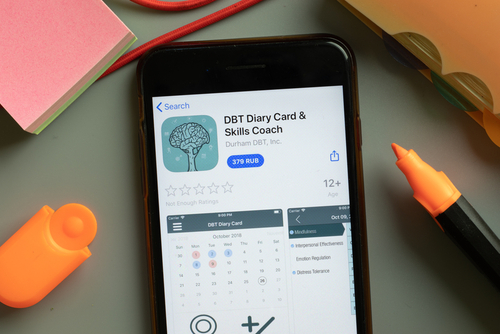Dialectical behavior therapy, also known as DBT, is a form of evidence-based psychotherapy that is founded on the principals of cognitive behavioral therapy (CBT) and rooted in mindfulness practices based on Zen Buddhist teachings. Psychologist Marsha M. Linehan developed DBT in the late 1980s as a means to help better treat chronically suicidal individuals diagnosed with borderline personality disorder (BPD). Although touched upon in cognitive behavioral therapy, DBT places primary emphasis on the psychosocial aspects of treatment. Currently, DBT is not only considered to be the gold standard form of treatment for individuals diagnosed with BPD, but according to Behavioral Tech has also been found to be effective in treating other mental health conditions such as bipolar disorder, eating disorders (e.g., bulimia nervosa, binge eating disorder, etc.), trans diagnostic emotion dysregulation, attention deficit hyperactivity disorder (ADHD), depression, and more. There are different components that make up dialectical behavior therapy, and each have a distinct purpose.
The Process
Dialectical behavior therapy is comprised of three distinct therapeutic settings, including weekly individual psychotherapy (one-on-one therapy) sessions; weekly DBT skills group sessions, and access to twenty-four-hour support between sessions via phone coaching, when needed. One-on-one therapy sessions are intended to provide personalized support for individuals with processing experiences, addressing issues, navigating challenges, and identifying successes that occurred in the previous week. The group skills sessions focus on teaching four sets of behavioral skills, known as the four modules, which include:
- Mindfulness: focuses on improving a person’s ability to accept and be present in the current moment.
- Distress tolerance: focuses on increasing an individual’s tolerance of negative emotion instead of attempting to avoid or escape from it.
- Interpersonal effectiveness: focuses on communicating with others in a way that maintains self-respect and strengthens relationships
- Emotional regulation: focuses on strategies to de-escalate charged emotions.
Homework, including regularly completing diary cards, is often assigned after each group skills sessions to help further facilitate understanding the information taught.
DBT Diary Cards
A diary card is a unique tool used throughout the DBT process. Different than keeping a traditional diary, a DBT diary card is a grid-like form that is essentially a behavior tracking tool to be completed regularly and referred to during individual therapy sessions. The purpose of a diary card is to track emotions, identify which DBT skills were used and determine if the skills used were effective throughout the week. One-on-one therapy sessions provide an individual with the opportunity to go over and learn from his or her diary card. The therapist will provide support and guidance related to areas of struggle illuminated from one’s diary card, to help the individual pinpoint exactly where something may have taken an unproductive turn and avoid a repeat incident.
Disclaimer:
The information above is provided for the use of informational purposes only. The above content is not to be substituted for professional advice, diagnosis, or treatment, as in no way is it intended as an attempt to practice medicine, give specific medical advice, including, without limitation, advice concerning the topic of mental health. As such, please do not use any material provided above to disregard professional advice or delay seeking treatment.


